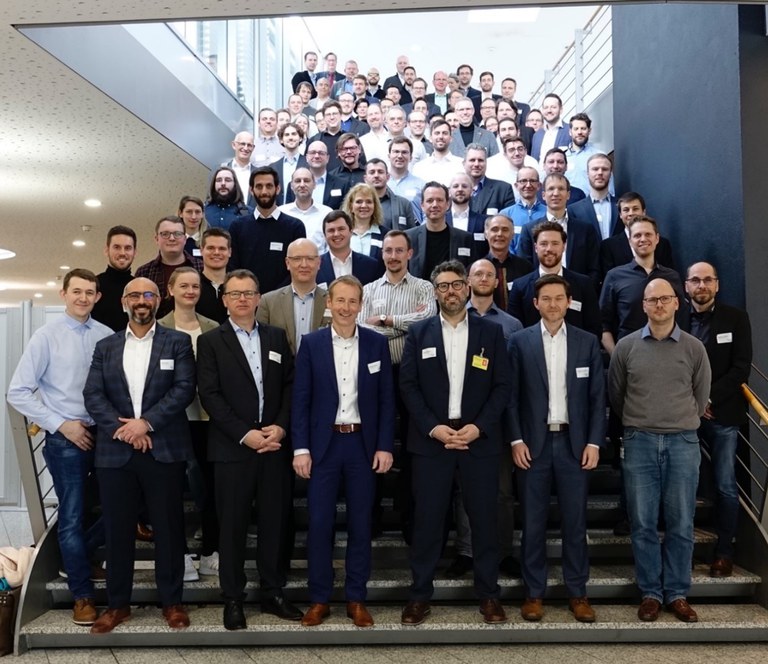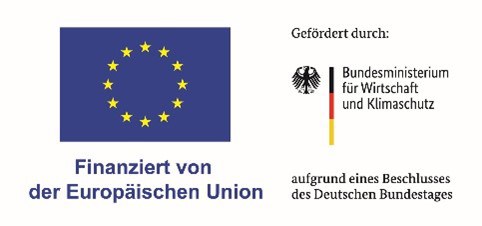Kick-off to the future of fully digital product development and sustain-able electric drive architectures
Published on March 30th, 2023
Consisting of 26 funded and 2 associated partners from industry and academia, the DigiTain research project started on January 1, 2023, with a total project duration of 36 months. In DigiTain, processes, methods and models for fully digital product development and certification of sustainable electric drive architectures are being developed and tested using a physical technology platform. The project is funded by the German government as well as the European Union as part of the economic stimulus package, KoPa 35c within module b: New, innovative products as the key to vehicles and mobility of the future. “In particular, the holistic approach, which integrates several technological innovations at once, the cross-value-added networking of the partners and their specialist expertise, as well as the associated transfer potential to industry and society, make DigiTain a lighthouse project of our specialist program”, says Stefan Heidemann from the Federal Ministry for Economic Affairs and Climate Action (BMWK). The project sponsorship for DigiTain was assigned to the TÜV Rheinland Consulting GmbH.

A detailed description of DigiTain
Ecologically and economically sustainable criteria in vehicle and drive architecture development are becoming increasingly relevant in politics, society, and industry. The technical-economic criteria of classical product development and subsequent optimization with an ecological product evaluation only in the late phase of product development are therefore no longer sufficient and up to date.
The sustainability assessment during the product development process currently confronts developers with major challenges. Suitable digital processes, methods, and tools for the ecological optimization of the entire vehicle, including the propulsion components, are not available. In addition, there is a lack of binding standards for fully digital product development and evaluation, which means that many experimental validation tests are still required for certification.

Description of the scopes of DYNAmore
DYNAmore, an Ansys Company, is responsible in DigiTain for a central work package targeting development of new approaches in the spatial discretization of the Finite Element Method and homogenized, data-driven constitutive models, with the aim to implements these into the simulation suite LS-DYNA. In cooperation with partners from the University of Stuttgart, improved element formulations of shell and solid elements for classical Finite Element Technology are being developed. This need results from changed requirements for structural load transfer in crashworthiness applications due to modified packaging of the upcoming, new propulsion technologies. On the other hand, the new technology of isogeometric analysis, in which LS-DYNA is considered the market leader and technology driver, will be further developed in cooperation with the partners BMW and Mercedes-Benz. Final goal will be productive application in full vehicle models. Furthermore, together with specialists from the University of Stuttgart and the participating Fraunhofer Institutes, DYNAmore is developing homogenized, data-driven and scale-bridging constitutive models to push the current limits of prediction quality in crash simulation for finely meshed vehicle components. The developments mentioned above will be advanced collaboratively with the partners towards applications on component level and finally deployed to a physical technology platform. And last but not least, DYNAmore is intensively involved in the development of a modelling catalogue that shall become the first step into the standardization and eventually certification of simulation models. "With the even better prediction quality of models for crash simulation envisioned in DigiTain, the certification of these models and the resulting envisioned homologation of products via the digital twin may be within reach," says Professor André Haufe, head of the
DYNAmore Material Competence Centre. "This not only helps to save very high development efforts in prototype building and testing, but also shortens the overall development time even further. This in turn allows development engineers to perform more optimization loops for even more sustainable designs. We are pleased to be able to play a significant part in sustainable product design with this development efforts in future."
About ARENA2036
ARENA2036 is responsible for and works on the knowledge transfer and dissemination package in DigiTain. The aim is to ensure that the results and tools generated can also be used outside the consortium and to facilitate interdisciplinary scientific exchange. At the same time, this work package forms the interface towards society in order to sensitize the general public to technological developments in terms of sustainability.
